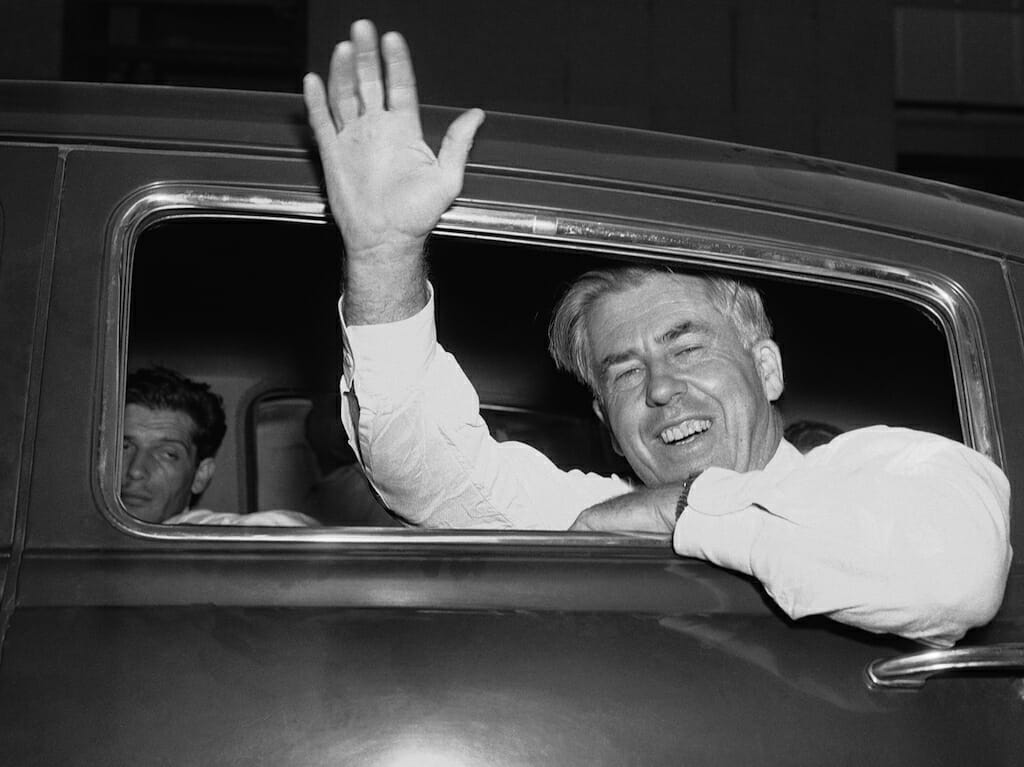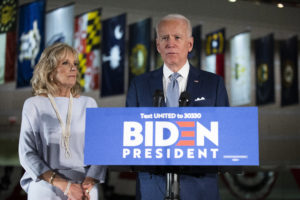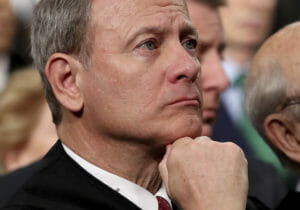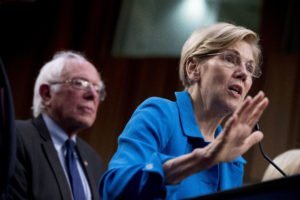When It Comes to Visionary Peacemakers, Trump Is No Henry Wallace
What the former vice president and Progressive Party presidential candidate advocated during the Cold War should be a benchmark for progressives judging our president today. Henry Wallace leaves Birmingham, Ala., in September 1948 after refusing to address a segregated audience. (AP)
Henry Wallace leaves Birmingham, Ala., in September 1948 after refusing to address a segregated audience. (AP)
Some progressives want to glorify Donald Trump as a peacemaker trying to end a new Cold War. When I see this, I think of how badly the president compares with a little-remembered opponent of the past Cold War: Henry Wallace, who resolutely fought for liberal causes as vice president of the United States from 1941 to 1945 and as a Progressive Party presidential candidate in 1948.
Why recall Wallace now? Because he was everything Trump isn’t. What Wallace advocated should be a benchmark for progressives judging Trump today. It’s important, at this moment in time, to go back in history and consider the Progressive Party candidate of 70 years ago.
This column isn’t addressed to the majority who carry the progressive banner. I am thinking of the minority who are being seduced by Trump.
Old-time progressives still recall crowding into Wallace’s 1948 Los Angeles rally at Gilmore Field, a major event of post-World War II politics. A few years ago, I met Bert Will, a main organizer of the event, and he reminisced with pride about what the Wallace movement meant.
Wallace got less than 3 percent of the popular vote, but, as Occidental College professor Peter Dreier wrote in HuffPost, he “framed the debate between progressives and conservatives.”
“Wallace was ahead of his time on most issues,” Dreier wrote. “He opposed the Cold War, the arms race with the Soviet Union and racial segregation. He was a strong advocate of labor unions, national health insurance, public works jobs and women’s equality. … He would have been, without question, the most radical president in American history.”
Influenced by Democratic conservatives, Southern segregationists and big-city bosses, Franklin D. Roosevelt dumped Wallace from the 1944 ticket in favor of Harry Truman.
Wallace was prescient. Dreier wrote, “In April, 1944, Wallace penned an article in [T]he New York Times, ‘The Danger of American Fascism,’ that warned about the growing right-wing movement in the United States—words that resonate today with the emergence of extremists like the Koch Brothers, the Tea Party and the ultra-conservative wing of the Republican Party. Wallace wrote: ‘The American fascists are most easily recognized by their deliberate perversion of truth and fact. … Their final objective toward which all their deceit is directed is to capture political power so that, using the power of the state and the power of the market simultaneously, they may keep the common man in eternal subjugation.'”
This accurately describes the Trump administration.
But first, let’s be fair and consider Trump’s meeting with North Korean leader Kim Jong Un.
Is it better to talk, even if the results are vague, than for Trump and Kim to be hurling nuclear threats at each other? Wasn’t the meeting such a great accomplishment that it overwhelms the harm Trump is doing to the country?
Not if the praise of Trump ignores the increasingly brutal treatment of thousands of undocumented immigrants—adults and children—seeking refuge from their dangerous home countries. Many of the children, as has been well documented, are being taken from parents, in some cases from mothers’ arms. These children are then locked up, many with inadequate care. Targeted at Latinos, the operation brushes aside immigrants’ few rights.
This operation smacks of the racism that characterizes the Trump administration. Such racism is as vile as that suffered by Latino youths during the Los Angeles Zoot Suit Riots during World War II and by Japanese-Americans imprisoned at the beginning of that conflict.
That’s not all. We progressives shouldn’t forget health care as a basic human right, a progressive goal since before Wallace. Trump is working through the courts and Congress to wipe out the Affordable Care Act. This would deprive millions, including those with pre-existing conditions, of medical care.
Rather than mention these unpleasant facts, Trump’s liberal defenders are giving us a rosy picture of the Singapore meeting. Here is a sampling:
Lindsay Koshgarian, who directs the National Priorities Project at the Institute for Policy Studies, wrote in a piece published on OtherWords: “Trump’s foreign policy instincts have had me white-knuckled for the past year and a half. But against a backdrop of possible nuclear war, it would be overly cynical not to recognize the meeting’s potential for good.
“At best, the meeting set the stage for North Korea’s denuclearization—and possibly even an end to the nearly 70-year-old, stalemated Korean War. If you’re against war, this is a good development.”
Truthdig Editor in Chief Robert Scheer wrote: “President Trump gave peace a chance like few presidents before him, and if his critics cannot respect that fact, shame on them. … That’s the real news here, a profound example of risking peace instead of war, and it should be celebrated in a nonpartisan spirit as a victory for sanity in world politics, whatever one’s prejudice against President Trump.”
Tim Shorrock’s report in The Nation was headlined, “Trump Meets Kim, Averting Threat of Nuclear War—and US Pundits Are Furious.”
Here’s how he described the event: “The mood was electric, and the reporters from Japan, Vietnam, Germany, Russia, France, and many other countries seemed genuinely excited about the prospects of peace in Korea. The feeling of camaraderie in covering a historic event was palpable; frequently during my two days there, reporters from one country could be seen interviewing crews from another.
“At the nearby White House press center at the Marriott, the atmosphere was far more subdued.”
In an interview in The Nation with radio talk show host Jon Weiner, historian and University of Chicago lecturer Bruce Cumings said, “There’s a silver lining in having Trump as president: He is untethered to anybody, especially the Washington establishment, and in a curious way he may be able to make a lot of progress when all those other folks would raise all kinds of problems and insist on a laundry list of all the things North Korea has to do to please us. We seem to be in a different realm now. I don’t think much was accomplished at the summit, but Trump is a person who likes to get to know people, and he seemed to cotton up to Kim Jong Un. I’m fairly optimistic at this point.”
In the face of all this support, should we give the guy some credit? Should we forget about the plight of the immigrants for the moment? Is it churlish to criticize what may one day be known as “The Miracle in Singapore”?
I think it’s our duty to bring up the treatment of immigrants at the border. And it’s not wrong to keep reminding everyone of Trump’s efforts to kill health care guarantees. And there’s more. Before Trump signed the skeleton Singapore agreement, he withdrew from the Iran nuclear deal, designed to control and reduce the nuclear threat from Iran, a nation with a more dangerous war-making potential than North Korea.
Professor Juan Cole, a noted Middle East expert, wrote, “It is likely that Trump’s violation of the Joint Comprehensive Plan of Action, the deal signed between Iran and the five permanent members of the U.N. Security Council plus Germany, was intended to set the stage for a push to contain Iran.”
That—or Iranian regime change—is the goal of Israeli Prime Minister Benjamin Netanyahu. By breaking the Iran deal, Trump was currying favor with him and his American Jewish right-wing Republican supporters. In taking their side, he is backing a cause opposed by most progressives and increasing the possibility of Middle Eastern combat that would probably draw us in.
Oh, well. Make a deal with Kim, make a deal with Netanyahu, make a deal with Putin. It’s all the same to Trump.
Your support matters…Independent journalism is under threat and overshadowed by heavily funded mainstream media.
You can help level the playing field. Become a member.
Your tax-deductible contribution keeps us digging beneath the headlines to give you thought-provoking, investigative reporting and analysis that unearths what's really happening- without compromise.
Give today to support our courageous, independent journalists.






You need to be a supporter to comment.
There are currently no responses to this article.
Be the first to respond.